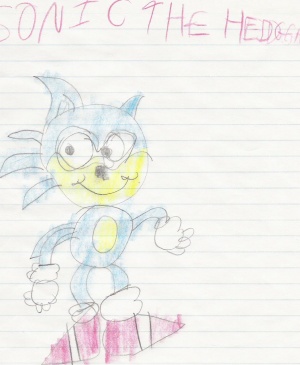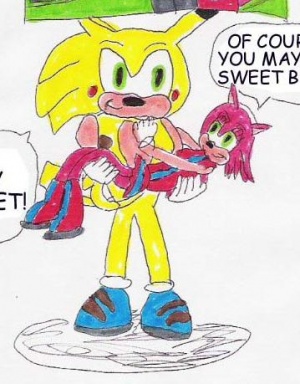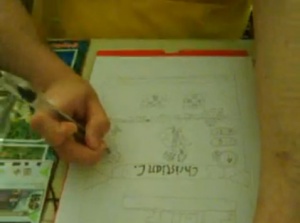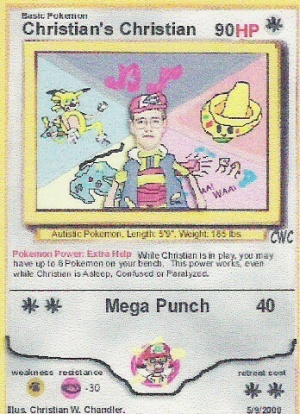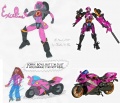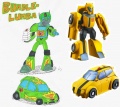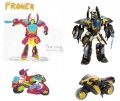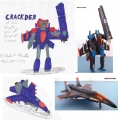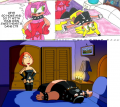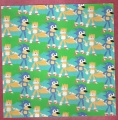Difference between revisions of "Chris and art"
Caboose -1 (talk | contribs) |
Apostrophe (talk | contribs) |
||
| Line 54: | Line 54: | ||
Chris started out with a cartoony style for the comic book, full of techniques consistent with early efforts at drawing by small children. Things changed as Chris got into [[anime]] and manga, and sought to emulate them to impress his [[gal-pal]] at the time, [[Megan Schroeder]]. Like many amateur western artists, he copies only the surface elements of the anime style: big eyes, pentagonal heads, speed lines. These art elements were simply laid over his original "style" with no adjustment. | Chris started out with a cartoony style for the comic book, full of techniques consistent with early efforts at drawing by small children. Things changed as Chris got into [[anime]] and manga, and sought to emulate them to impress his [[gal-pal]] at the time, [[Megan Schroeder]]. Like many amateur western artists, he copies only the surface elements of the anime style: big eyes, pentagonal heads, speed lines. These art elements were simply laid over his original "style" with no adjustment. | ||
Chris makes no attempt to maintain consistency in character designs, and has no understanding of classical anatomy and proportion in figure drawing. His characters are drawn using simple shapes & | Chris makes no attempt to maintain consistency in character designs, and has no understanding of classical anatomy and proportion in figure drawing. His characters are drawn using simple shapes — colored-in outlines — and even so, he is unable to keep the shapes consistent to any degree. For example, in the opening of [[Sonichu 11]], [[Sonichu and Rosechu's Children|the children]] tend to noticeably get deformed in different manner in each panel, despite the fact that they're drawn as just an oval for head, a retangle for body and smaller ovals for arms and legs. In all characters, limbs morph, heads change size, and faces become unrecognizable; it's only by color scheme that we can guess which character is which. Beyond his differently-colored eyes and Sonichu medallion, no two Chrises have ever looked alike, or even remotely resembled the actual Chris. The character sizes are also inconsistent, which is strange considering most of the characters appear to be about the same size: in most drawings where Sonichu is carrying Rosechu, Rosechu seems to shrink. Finer details of human anatomy have long escaped him; because Chris never draws women with pronounced hips, the results tend to resemble children or men, with [[Pedofork|unfortunate]] [[Lovely Weather|implications]] in either case. | ||
Chris owns at least one book about drawing manga, as seen in [[My Half of A Whole New World for Kacey]]. The book in itself covers everything to do with portraying couples, including images of couples in bed making love. Whether Chris bought it to better draw out his delusional fantasies or for more material to gawk at during [[mass debating|Mass debating]] isn't known. Either way, the book has taught him nothing. | Chris owns at least one book about drawing manga, as seen in [[My Half of A Whole New World for Kacey]]. The book in itself covers everything to do with portraying couples, including images of couples in bed making love. Whether Chris bought it to better draw out his delusional fantasies or for more material to gawk at during [[mass debating|Mass debating]] isn't known. Either way, the book has taught him nothing. | ||
Revision as of 18:48, 6 June 2010
Art has been, and always will be, Chris's selling point. From the very day Jason Kendrick Howell found out about Chris and his creation of Sonichu to today, many people have taken interest in Chris because of his infamously bad artwork. Encouraging Chris to produce more of it remains a popular troll objective.
The sad part is, this is the closest Chris has to an actual "skill." It's no wonder he's never been able to keep a job.
Chris and the medium
Exercise of skills and improvement in craft
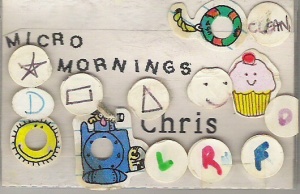
Since Chris first started drawing, his artwork has been abysmal. The extent to which it has improved since the first time he drew Sonic the Hedgehog is accidental. Chris has never considered his artistic skill in need of improvement; he is always fully satisfied by the first attempt at a drawing he makes.
Because he believes his art is already perfect, Chris does not see the need to practice. He does no drawing exercises. He cannot look for room for improvement in his drawings because he refuses to accept the idea that his drawings can be in any way flawed.
Chris has said he spends "an hour at most" drawing a comic page and about a half-hour coloring it.[1] In other words, he invests only a fraction of the time most serious artists put into their work.
Chris seems to view the act of creating as almost a chore. Because to him every idea he has is perfect from the moment it pops into his head, creating is just a matter of recording his genius. Chris enjoys expanding Sonichu stories in summary form on CWCipedia, a medium better equipped to keep up with his racing and easily distractible imagination. Chris considers everything he says or writes to be a part of his comic's continuity partly because it is easier to record these euphoric and fleeting bouts of inspiration as they occur rather than days, weeks, months or even years later in comic form.
Chris believes that everything he creates is inherently worthy of adoration, and that it will bring him legions of adoring fans and the attention of women.
Comic writing and structure
- Main article: Chris and writing
Chris is as poor a writer as he is an artist. Chris does no preparatory writing or preliminary revision, his narrative is wholly improvised and shifts regularly, he cannot write clear, succinct dialogue, and has little regard for visual clarity.
Choices of materials and technology
Chris believes that his so-called "hand-drawing style" is superior to art produced by any other means. This is due to Chris's hatred to change what he has already learned and his belief, as a consequence of his ego, that his method is the best by virtue of being his.
Obviously, Chris's skill cannot compensate for the poor materials he uses. He does his work a disservice by using tools that are the cheapest available: copy paper, ballpoint pens and Crayola Magic Markers. These happen to be the tools he has used since childhood.
Chris's artwork is far from archival quality, and in some instances shows signs of wrinkling as soon as it has been finished. Chris has defended his practice of rampant textwalling as a way to "save marker ink."[2]
Chris appears to have some version of Photoshop at his disposal (as seen in the "Spider-Man-fucking Clyde" saga), but uses it sparingly outside of lettering. Chris's font of choice is Comic Sans, a font that is almost universally condemned as overused and ugly.[3][4]
Chris believes that using new technology creatively provides an unfair advantage in the service of inferior results. Chris has consistently called Asperchu "blocky and low resolution" because it was drawn with a tablet. In one of phone calls to Alec Benson Leary, Chris said his hand drawn art had "more character." He also thinks that his web page was awesome because it was made from "notepad scratch," rather than with a text editor program.
Drawing techniques
Chris has never even learned to hold a pen correctly. Instead of holding the front of the pen with the thumb and forefinger, he draws with his index finger sticking out and bent around the pen.
While most artists will produce multiple sketch versions of a single drawing, often layered on top of one another, Chris's confidence in his innate artistic ability is such that his first step in a page of Sonichu is drawing the final art in pen.
Visual style and anatomy
Before the comics, Chris attempted realism for work in oil pastel, charcoal and graphite, presumedly for art classes in school. The results can be seen below.
Chris started out with a cartoony style for the comic book, full of techniques consistent with early efforts at drawing by small children. Things changed as Chris got into anime and manga, and sought to emulate them to impress his gal-pal at the time, Megan Schroeder. Like many amateur western artists, he copies only the surface elements of the anime style: big eyes, pentagonal heads, speed lines. These art elements were simply laid over his original "style" with no adjustment.
Chris makes no attempt to maintain consistency in character designs, and has no understanding of classical anatomy and proportion in figure drawing. His characters are drawn using simple shapes — colored-in outlines — and even so, he is unable to keep the shapes consistent to any degree. For example, in the opening of Sonichu 11, the children tend to noticeably get deformed in different manner in each panel, despite the fact that they're drawn as just an oval for head, a retangle for body and smaller ovals for arms and legs. In all characters, limbs morph, heads change size, and faces become unrecognizable; it's only by color scheme that we can guess which character is which. Beyond his differently-colored eyes and Sonichu medallion, no two Chrises have ever looked alike, or even remotely resembled the actual Chris. The character sizes are also inconsistent, which is strange considering most of the characters appear to be about the same size: in most drawings where Sonichu is carrying Rosechu, Rosechu seems to shrink. Finer details of human anatomy have long escaped him; because Chris never draws women with pronounced hips, the results tend to resemble children or men, with unfortunate implications in either case.
Chris owns at least one book about drawing manga, as seen in My Half of A Whole New World for Kacey. The book in itself covers everything to do with portraying couples, including images of couples in bed making love. Whether Chris bought it to better draw out his delusional fantasies or for more material to gawk at during Mass debating isn't known. Either way, the book has taught him nothing.
Character design
- See also Characterization
A large portion of Sonichu's cast is clearly derivative of existing characters. In addition to the obvious Sonic the Hedgehog recolors, Chris has lifted designs from any anime, video game, or even western animation he is fond of, with no regard for visual consistency.
Beyond that, he doesn't even bother trying to design better clothing for his characters. Most of them wear stereotypical "basic" clothing and Chris himself wears his usual clown shirts and pants. With the sole exception of Meg-chan, every female that shows up in his comics wears high-heeled dress shoes.
Even when the source of Chris's plagiarism is readily apparent, these lifts can still add up to less than the sum of their parts. Inspired by the fusion characters of Dragon Ball Z, Colossal Chan looks more like a hobo than a fusion of Chris and Chris-Chan Sonichu. Though clearly his own effort to design Baby Pokemon, Sonee and Rosey look more unnerving than adorable.
Fan Service
Fan service is a term used to describe something that is meant to tease or please the audience. It can refer to focusing on popular characters, making inside references that only the die-hard fans will get, romantically pairing off (or hinting at the possibility of pairing off) fan-preferred couples, or many other techniques of telling the fans that the writer knows what they want, or thinks so, anyway. Primarily, however, it has come to refer to scenes of a sexually titillating nature, such as dressing attractive characters in revealing outfits or framing the shot or panel in such a way as to draw attention to the character's shapeliness. That's certainly what it means here.
Since his discovery by the Internet, Chris has inserted increasingly large amounts of fan service into the initially tame Sonichu in an effort to assert the heterosexuality of himself and his characters. The range of fan service in Sonichu includes panty shots, Rosechus stripping, cameltoe indentations, and even a full sex scene followed by four pages of text and diagrams describing Sonichu and Rosechu's sexual anatomy.
Due to his lack of artistic faculties, much of Chris's depictions of sexuality are highly unsettling to most readers. Any attempts to add "sexy" material come across as Chris's own wish-fulfillment, rather than attempts by Chris to please his audience.
While the point of fan service is to hint at sexuality in an otherwise clean work meant for general audiences, Sonichu's sexual content hides nothing and disturbs many, despite the fact that Chris has always viewed Sonichu as a comic intended for children.
Chris and the industry
- Main article: Chris and the industry
In the Sonichu Chronicles and Chris's resume, it's revealed that Chris is under the impression that his art is of professional quality, and expects to enter the comic and video game industries. His résumé states a desire to produce Sonichu comics under contract for Marvel Entertainment or Archie Comics. By all indications, this is an idle wish as Chris expects to be approached by these companies first. Chris has consistently shown little comprehension of, or interest in learning about, how the creative industries actually work.
Originality
He has none. Let's leave it at that.
Plagiarism
- See also: Chris and copyright
Sonichu is a fine blend of a wide variety of recognizable copyrighted elements. Just about any existing media that Chris has ever expressed a fondness for appears in some capacity.
Chris has a long history of claiming all credit for fan characters initially acknowledged as being created by others and offered for use in Chris's comics. The first of these were Megagi, Jiggliami, and Layla, but the most infamous instance, and the one that Chris defended the most fervently, was Simonla Rosechu.
At the same time, Chris once had a policy of threatening nonexistent legal action against the creators of any Sonichu fan art he could find, and was worked into a magnificent rage over the Sonichu-derivative fan work Asperchu.
Tracing
Tracing is an art technique where another piece of art, in whole or part, is copied along its outlines. As a means of producing original art claimed as one's own, tracing is a form of plagiarism.
Images traced from existing copyrighted content appear regularly in Sonichu. Chris traces with the "Reflecta Sketch," a since discontinued toy tracing kit produced by Spin Master. The kit comes with a reflective piece of plastic where an original can be placed to the left and the reflection is used for tracing an outline. This is why most traced images in Sonichu are mirror images of the original work. Due to their poor quality, consistent in appearance with Sonichu art that is not traced, these traced images often go unnoticed as tracing. The fact that Chris fails even at tracing is a surprise to no one.
Traced images from the Sonichu Comic
Rule 34
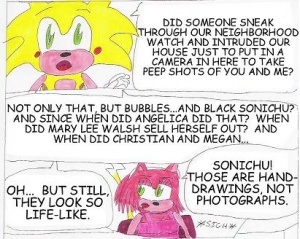
As Chris has no shame, neither does his artwork. Of his many sexually explicit drawings, the most damning one of all is ShecameforCWC.jpg, which brought an end to the Megan Saga and cemented the notion that Chris was an incestuous pedofork.
As seen in this gallery, Chris can't even copy bad porn to save his life, with Rosechu turning into a deformed monstrosity in each panel, all for the sake of sex. Especially noticeable is the final picture, which shows off a recurring trend in his pictures: the "Glowing Cunt", in which Chris draws the "cum" from the woman around and outside the vagina instead of from the inside, making it appear to glow.
It can be reasonably assumed that all of the images in this gallery are traced, and that those not paired plagiarized source material simply have yet to have their "inspirations" discovered.
Gallery of traced Rule 34 pictures
| Incredibly horrific and NSFW, this is your last chance to escape with your sanity |
|---|
Gallery of Art
Seen below is a selection of Chris's public school art assignments, from a slideshow on Chris's homemade DVD. At his high school graduation, Chris expected to be "Highly Recognized" for his "ARTISTIC TALENT," represented in this body of work. When he was not, he cried.[5] This work was produced under the supervision of a professional art instructor and the incentive for Chris to give each piece more thought, care and attention than he now prefers to when creating only for his own satisfaction.
| Gallery of Chris's art |
|---|
|
TL;DR
Chris is an anti-artist.
Sauces
| Chris and... |
|
Body: Drugs • Fashion • Gender • Health • Nutrition • Sex Psyche: Coping • Manipulation • Mental healthcare • Nostalgia • Reality Personality: Anger • Ego • Hypocrisy • Introspection • Kindness • Negligence • Personality • Remorse • Stress Expression: Art • Censorship • English • Language • Music • Oratory • Spanish • Writing Society: Animals • Contests • Death • The Law • Politics • Pornography • Race • Reading • Religion • Sexuality • Socialization • Sports Business: Brand loyalty • Business • Copyright • Money • Negotiation • Work Technology: AI • Cameras • Electronics • The Internet • Science • Television • Video Games |
